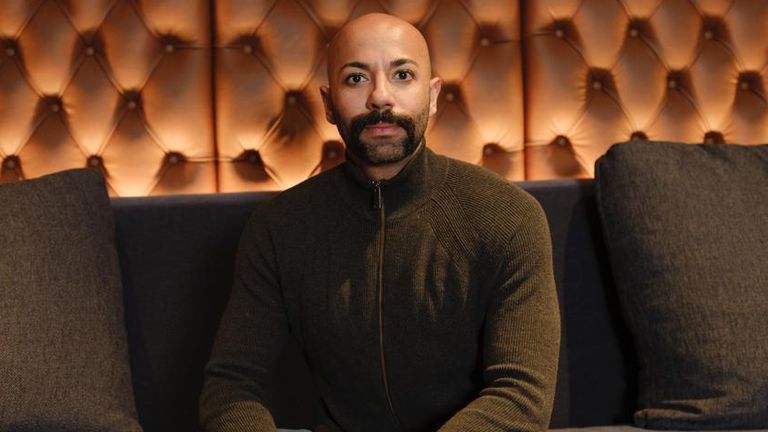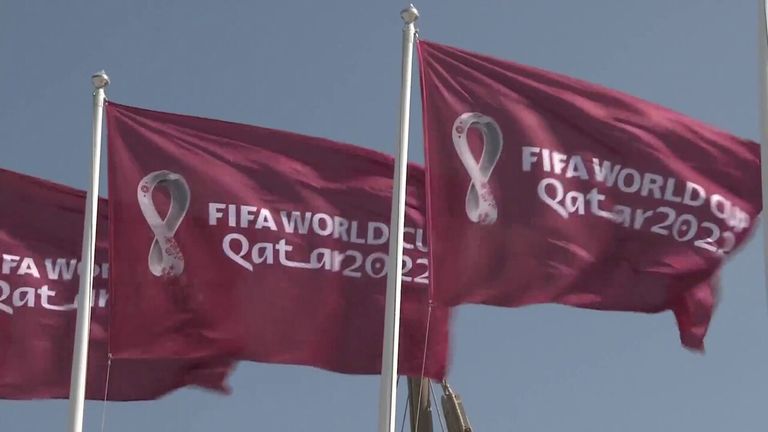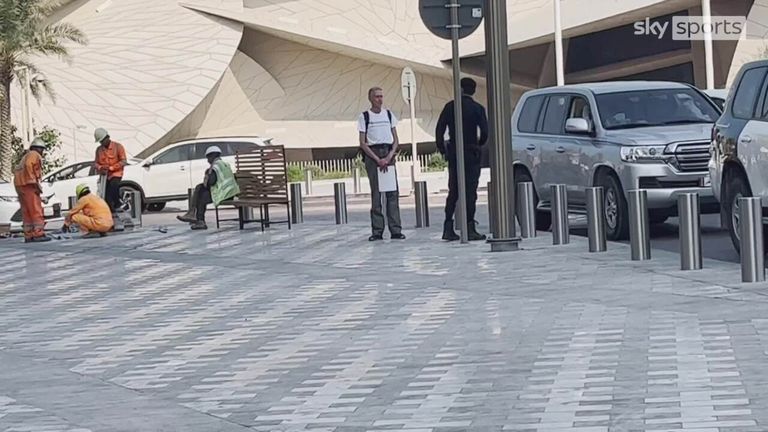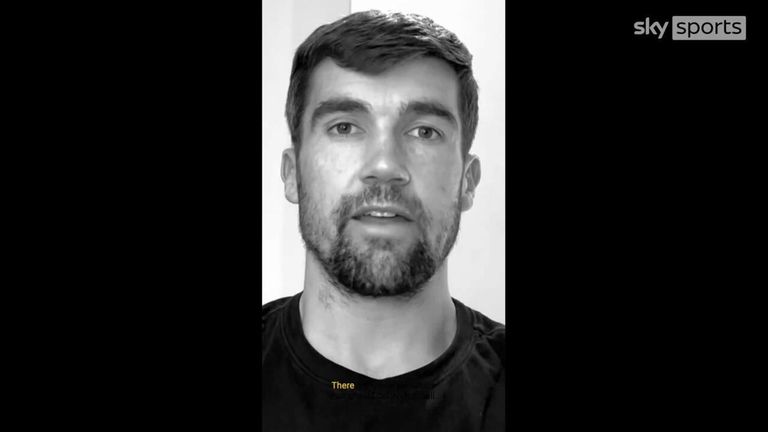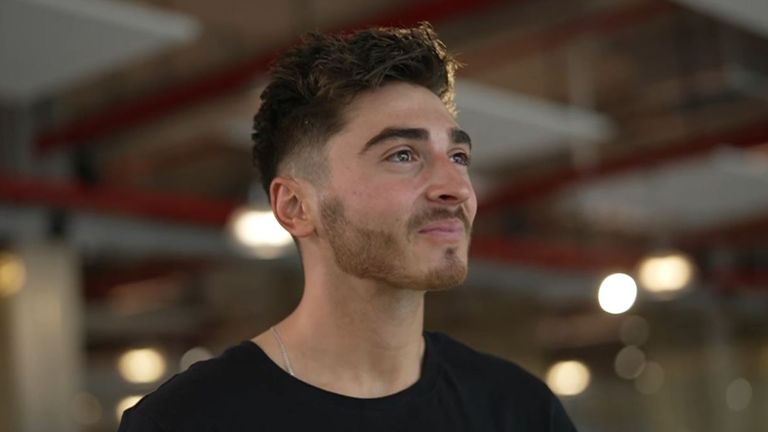Qatar 2022 World Cup: Dr Nas Mohamed urges football community to support campaign highlighting ‘persecution’ of LGBTQ+ people
Dr Nas Mohamed, the only publicly out LGBTQ+ Qatari, is gathering testimonies describing discrimination and abuse from people in his homeland. He’s been talking to Kick It Out about how football can help
Tuesday 1 November 2022 21:02, UK
Playing a part at the World Cup was once a serious career ambition for Dr Nas Mohamed.
The Qatari physician trained in sports medicine and could have been one of those tending to the bumps and scrapes of superstars inside the billion-dollar stadiums.
Instead, he is firmly on the outside as his country of birth prepares to stage the planet's biggest sporting event - but feels that's where he is best placed to ultimately help save lives.
If you'd told him even six months ago that he would become one of the most prominent human rights campaigners around the tournament, his name appearing in headlines alongside that of David Beckham, giving interviews to outlets on every continent, he would have shaken his head.
Now, however, he deals with the day-to-day reality of receiving messages from fellow Qataris who are lesbian, gay, bi and trans and who relate to his story in ways that are often eye-opening and sometimes overwhelmingly sad.
This is all because, in May, he did something ground-breaking that no other Qatari had ever done before - he spoke publicly in the media about growing up gay.
"I've got to learn a lot since then because Qatar never had this moment, honestly. We never had a coming out moment," he says.
"And I really believe in the power of coming out for LGBT+ people because I'm seeing and experiencing now how it's anchoring a lot of the support and the people affected."
Dr Mohamed connected five of his contacts to Human Rights Watch for their recent report which carried claims about the arrests and ill-treatment of individuals at the hands of a police unit called the Preventive Security Department.
Upon its publication, a Qatari government spokesperson hit back at the international advocacy organisation, accusing it of releasing "demonstrably false information". FIFA chose not to directly address the HRW allegations in its own response.
Since then, more LGBT+ Qatari citizens have been in touch with Dr Mohamed. Some have asked to be included in future reports. They hope that the World Cup spotlight might reveal a route out of what seems like an impossible situation.
He is determined to help them. "A huge part of the reason I'm participating in these conversations is to bring visibility to the people that cannot sit at the table."
'The victims suffer from PTSD'
The people Dr Mohamed is referring to aren't being spoken about by the Qatari authorities.
They aren't the fans set to visit from overseas who were recently reassured by Supreme Committee chief executive Nasser Al-Khater that they are free to wave rainbow flags and even hold hands, if they want to. The UK's Foreign Secretary, James Cleverly, recently made a similar attempt to get LGBT+ supporters onside, telling them they should "respect the culture" of their hosts and all would be well.
They aren't the concerned players, coaches, referees, members of the media or other travellers who are gay or bi and who could potentially be involved in the World Cup, in a wide range of roles.
Those in touch with Dr Mohamed, who lives and works in San Francisco having been granted asylum in the US four years ago, are anonymous "survivors" who will still be in Qatar after the FIFA circus packs up and moves on.
They are not safe to speak out publicly due to intense surveillance that keeps them stuck in the shadows. A light was shone in their direction last week via Peter Tatchell's one-man protest in Doha and a video message from Australia's Socceroos stars, who said: "As players, we fully support the rights of LGBTI+ people, but in Qatar, people are not free to love the person that they choose."
But there has otherwise been little acknowledgement from the football community - so on behalf of those back home, Dr Mohamed has been talking to the anti-discrimination organisation Kick It Out in a bid to raise wider awareness in the game of what life is like for LGBTQ+ people in his homeland.
"A lot of these conversations focus on LGBT+ fans coming to the World Cup and leaving," he says. "But I think the people that would suffer most would be the local LGBT+ community because they would be facing any retaliation related to this World Cup being held in Qatar.
"The types of persecution they suffer ranges from social rejection, to an inability to hold and maintain a job because of gender expression, to struggles within the healthcare sector. But then they really get into much darker dimensions as well."
The testimonies he has been sent include allegations of how cybersecurity is used by the Preventive Security Department to monitor the activity of citizens and detain those who are seeking help over matters of sexual orientation and gender identity, or who are trying to form same-sex relationships.
Dr Mohamed has heard stories of 'fake dates', raids on people's homes, and families searching for relatives who have gone missing. Some of the fellow Qataris he is in touch with claim they have been kept in solitary confinement for extended periods of time, and that upon release, they were mandated to undergo so-called 'conversion therapy' treatment.
This was documented in the Human Rights Watch report which also noted: "In all cases, LGBT detainees said, Preventive Security forces forced them to unlock their phones and took screenshots of private pictures and chats from their devices, as well as contact information of other LGBT people."
Dr Mohamed adds: "All of the victims that I've interviewed myself suffer from PTSD. A lot of them hear sounds and have images that pop in their head from the time they were tortured and that is very dark.
"To have that reality exist and at the same time, to go in and have an event like the FIFA World Cup, say publicly that gay fans are welcome and have that be the only narrative for LGBT+ rights in Qatar is wrong. It's just straight up wrong."
A closer examination
Wrongs and rights. Competing narratives and complex stories. Traditional cultures and Western viewpoints. The football is almost a footnote - and it will probably feel that way until at least mid-November when the Premier League season hits pause.
It's why the Supreme Committee, the tournament organisers, are constantly trying to promote the positives of Qatar - innovation, hospitality, the sense of wonder. FIFA president Gianni Infantino says he is hoping for a festival of "unity and peace". But the discord continues.
Dr Mohamed insists he has no desire to guilt trip anyone and the affection he still holds for Qatar shines through. He appreciates how people there have taken football to their hearts and that hosting the World Cup has brought some change, such as on migrant workers' rights. His upbringing taught him all about the respect being demanded by Al-Khater and other senior figures.
But in the 12 years that have elapsed since Qatar's name was pulled from an envelope by Sepp Blatter, he says the advances made on human rights are simply not strong enough - and that he owes it to his younger self to advocate for those LGBTQ+ citizens who cannot escape. He feels the word 'culture' is being used as a concealer.
He has put together a petition with All Out, the global not-for-profit movement, that condenses his key objectives into two demands - the decriminalisation of homosexuality in Qatar so that "love is not a crime" at World Cup 2022, and the permanent repeal of the country's discriminatory anti-LGBTQ+ law, Article 296. The latter's undefined "immoral actions" term leaves it open to the interpretation of the courts and the ruling elite; those punished under the legislation face up to three years' imprisonment.
Tens of thousands have signed his petition so far and Dr Mohamed is confident that the more understanding there is about Qatar's policies - away from the PR and spin - the more the support will grow. "The first step to getting help is that visibility," he says.
Kick It Out, which has been at the forefront of campaigning for equality through football for over 25 years, is similarly keen to cut through the rhetoric. A year ago, it convened a Qatar 2022 Working Group with other organisations to explore how the tournament might be best harnessed to amplify LGBTQ+ voices in the region.
The FAs of England and Wales are part of the 'One Love' group of national associations whose captains intend to wear distinctive multi-coloured armbands in games in a collective stand against all forms of discrimination.
But will the gesture made by Harry Kane, Gareth Bale and co be effective? Dr Mohamed is more encouraged by the comment made by Gareth Southgate in September that players could be willing to "talk about those issues and put them on the table".
"I believe people with big platforms in football have the responsibility to use those platforms to bring awareness to human rights violations," he says, "because it's their platform that's being used as a tool for reputation laundering this year."
The goal of solidarity
In recent months, Dr Mohamed has attempted to get the attention of David Beckham, the face of Qatar's World Cup marketing machine.
The England legend seems a reasonable target for an approach - Sir Elton John is a godparent to Beckham's sons Brooklyn and Romeo, and on more than one occasion, the former Manchester United star has said he is "honoured" to have been thought of as a gay icon.
Yet so far, the Beckham camp has chosen not to engage with Dr Mohamed, who says he was blocked and then 'unblocked' when he tried to make contact via their verified Instagram accounts.
Beckham's avoidance of conversations about human rights in Qatar is telling, says Dr Mohamed.
"I want you to think of the average LGBT+ Qatari there," he adds.
"It's really difficult to free yourself from that dictatorship. It's important to see the dynamics and the obstacles we face."
He suggests that if someone like Beckham finds topics of equality to be taboo, they are even more off-limits to residents. "Some of the questions I've been receiving are from people questioning why we don't have public LGBT+ stories from Qatar. Well, here is a public, global display of why."
Hearing so many harrowing stories has been draining for Dr Mohamed, who has thrown himself into activism alongside the day-to-day running of his own medical practice in the Bay Area. Yet he feels a breakthrough is coming, with details gradually seeping out about the ill-treatment of LGBT+ people in Qatar and resources being built to support asylum cases like his own.
Conscious that more major sports events are sure to follow in the Gulf region, his long-term goal is to create its first LGBT+ non-profit organisation. But before that is launched, what will he do when the World Cup kicks off and the football takes over?
"I just don't want the sense of hope to be crushed for people in Qatar. We shouldn't underestimate the power of inspiring people and letting them know it can get better for them.
"That's something I'm going to really try to communicate - despite all the societal, traditional, political, economic obstacles that they have in front of them, from being born in Qatar and being LGBT+, there is hope."
